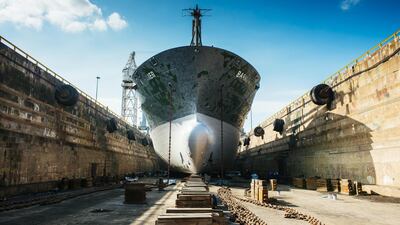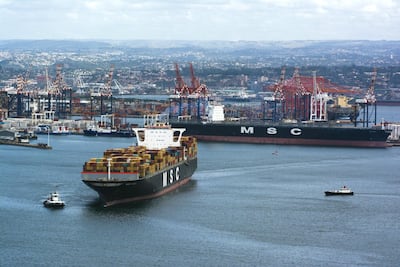In just six months the world’s cargo shipping fleet will have to switch to cleaner burning fuel, and ports globally are preparing for the change.
In January the International Maritime Organization (IMO) will implement a new benchmark for the bunker fuel that the vast majority of ships use to power themselves across the oceans.
Sulphur found in ship emissions must be slashed from the 3.5 per cent global limit currently in place to half a per cent. Ships are a major source of greenhouse gas emissions. Just how major is illustrated by a report issued in June by the European Federation for Transport and Environment (T&E): Carnival, the world’s largest luxury cruise operator, emitted nearly 10 times more sulphur oxide around European coasts than did all 260 million European cars in 2017.
“Luxury cruise ships are floating cities powered by some of the dirtiest fuel possible,” said Faig Abbasov, shipping policy manager at T&E. “Cities are rightly banning dirty diesel cars but they’re giving a free pass to cruise companies that spew out toxic fumes that do immeasurable harm both to those on board and on nearby shores. This is unacceptable.”
It is not just cruise ships that are polluters. Some 53,000 merchant vessels ply the seas, according to the United Nations Conference on Trade and Development. More than 90 per cent of the world’s produce, from food to minerals to manufactured goods, travels by sea at some point in the journey to the customer.
In doing so, the world cargo fleet requires 300 million tonnes of fuel oil, giving the international maritime shipping industry about the same carbon footprint as Germany, the IMO says. This comes down to the heavy fuel oil that vessels use, a substance similar to diesel. Mostly, it is cheaper to procure and adds to a shipping company’s bottom line.
For instance, fuel oil is trading at around $52 a barrel, while regular Brent crude is about $66 a barrel. The trade-off is the higher level of pollutants in fuel oil, which the new regulations are intended to limit.
“These new regulations are good for human health and good for the environment,” says Guy Platten, secretary general of International Chamber of Shipping. “We strongly recommend that shipowners prepare an implementation plan for each of their ships using the template agreed by IMO.”
For Africa-directed commerce, the question is how ready are the 172 ports that line the continent. Only a handful have adequate refining capacity, mostly in north Africa.
For most, petroleum products including bunker fuel must be sourced from international markets and imported. South Africa, one of the few countries with domestic refining capacity, is preparing for the changes, according to the country’s Maritime Safety Authority (MSA).
“It’s all systems go as far as that is concerned and it’s a big piece of legislation with far reaching consequences, says MSA acting chief executive Sobantu Tilayi. “What we now need to do as a country is to put in place the regulations necessary to effect the process from January 2020.”
However, the country is still coming to grips with the details of the plan, he says, such as the proper handling of ships coming into South African ports without the compliant fuel, the availability of facilities to test fuels in use by ships and the handling of vessels using non-compliant fuel but fitted with sulphur reducing equipment, among other issues.
Meetings were now underway with shipping companies, fuel providers and the IMO to finalise these, Mr Tilayi added. It is unclear however, if the country will meet the January 2020 deadline.
Further afield, securing compliance across the continent will likely be difficult. Few African countries pay attention to air pollution levels, in spite of warnings that conditions are worsening as cities grow. According to the United Nations Children's Fund (Unicef), only 6 per cent of African children live in areas that monitor airborne emissions.
“Air pollution is a silent killer of children," says Unicef executive director Henrietta Fore. “And in Africa especially, we know the problem is severe, we just don’t know how severe.”
Already indications are that children are exposed to airborne toxins that are harmful.
“Reducing children’s exposure to pollutants – and therefore reducing the damage to children’s health and early brain development – begins with a reliable understanding of the quality of air they are breathing in the first place.”
Few African countries have the technical resources to monitor emissions on land, let alone bunker fuel.
As a result, African ports could lose out as international vessels avoid them. Even though African countries such as Nigeria and Ghana produce oil, bunker fuel is sourced from Europe and Mediterranean refineries, says Natalie Gupta, an independent port consultant based in the UK.
“Ports in the region as a result may be impacted negatively in terms of a reduction of vessels bunkering at these ports,” she says. “The question then becomes whether vessels may, in a more extreme turn of events, decide not to call at these ports at all, preferring different routes in line with their new bunkering considerations.”
The irony is, much of the oil that African countries export is considered ultra-sweet (low in sulphur) and can potentially be transformed into compliance fuel without blending, Ms Gupta notes. Just under 50 per cent of African oil is light and sweet, and almost 30 per cent is medium and sweet in terms of its quality. Both quality levels have a sulphur content of less than half a per cent sulphur – the new standard.
As an aside, this may push demand for Africa’s less polluting oil by shipping companies worldwide, leading to an increase of the price of this type of crude, thus benefiting the region in terms of revenues from sales.
Still, lack of refinery capacity means it is unlikely many African ports will source bunker fuel locally. Some even worry that with around 4 million barrels of sulphur-heavy bunker fuel produced around the world today, the dirtier fuel will find its way to Africa and be burned in oil-fired electricity plants.
Many African cities rely on older oil-fired generators to provide electricity. These would eagerly purchase cheaper high-sulphur bunker fuel if it is dumped on the market.
The immediate challenge will be to ensure vessels calling at African ports have access to compliant fuel. The continent draws many of the world’s largest ships, especially bulk cargo carriers that transport resources such as iron ore, copper and agricultural products to international destinations.
Fortunately, many African ports have upgrades planned or underway, especially in West Africa where bunkering services are concentrated. Ms Gupta says it is now vital that these upgrades also incorporate the new low sulphur standard.


